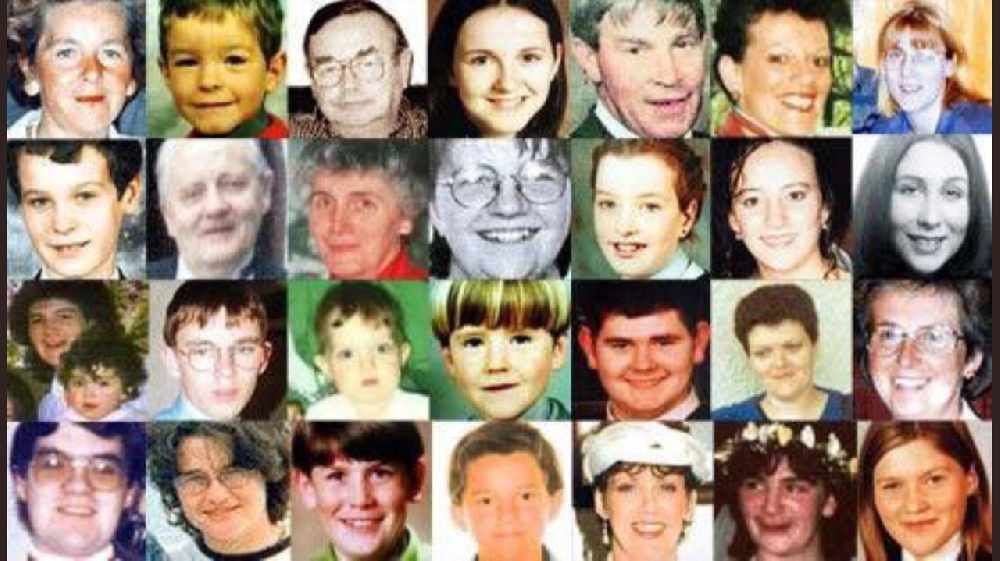
Q Radio News/PA
A High Court judge is to deliver a ruling in a legal challenge to the Government’s decision not to hold a public inquiry into the Omagh bombing.
Campaigners launched the action in 2013 in an attempt to force an inquiry into the Real IRA atrocity in 1998 which killed 29 people, including a woman pregnant with twins.
It was the worst single atrocity of the Northern Ireland conflict.
The long-running case concluded more than two years ago, and Mr Justice Mark Horner will deliver his judgment on Friday.
Michael Gallagher, whose son Aiden was killed in the blast, launched the judicial review after former Northern Ireland secretary Theresa Villiers decided not to order a public inquiry.
Ms Villiers argued that a probe by former police ombudsman Dr Michael Maguire was the best way to address any outstanding issues.

Victims of the Omagh bombing
Mr Gallagher said it was “unbelievable” that it had taken this long to get a ruling.
He said: “We launched this in 2013. The Government have dragged their feet. We are eight years locked into this process, hopefully now we will get some answers.
“It has been an unreasonable delay, there is something seriously wrong when this process takes eight years. The families are waiting on answers.
“I hope that having heard the evidence, the judge will rule in our favour.
“Whatever happens, it will go to appeal. We are just hoping if we get a positive outcome the Government will not delay us with a further legal process.
“Some people who lost family members in the Omagh bombing have passed on, it is just cruel and unreasonable that people can’t get answers to what happened to their loved ones.
“It is a burden we should not have had to carry. We have been waiting 23 years for answers.”
Earlier this year, former first minister Arlene Foster said the Omagh families deserved an apology over the delay to the ruling.
She said: “No one should be expected to wait eight years for a court judgment.”

Arlene Foster said the Omagh families deserved an apology over the delay
At the time the lord chief justice’s office said the judgment was “taking longer than initially anticipated”.
It added: “Due to the sensitive nature of the material involved in this case, the court is required to produce both an ‘open judgment’, which has been prepared in draft, and a ‘closed judgment’, which has to be completed before the open judgment can be published.
In their legal case the Omagh families claimed that intelligence from British security agents and Royal Ulster Constabulary officers could have been drawn together to prevent the dissident republican bombing.
On August 4 1998, 11 days before the bombing, the RUC received an anonymous telephone call warning there would be an “unspecified” terrorist attack on police in Omagh on August 15.
The force’s Special Branch, which handled intelligence from agents, took limited action on the information and a threat warning was not sent to the sub-divisional commander in Omagh, an investigation by former police ombudsman Baroness Nuala O’Loan found.
An RUC review concluded in 2000 that the information should have been passed to the commander.


 Rescue operation to free 40 cows after lorry overturns on motorway
Rescue operation to free 40 cows after lorry overturns on motorway
 New date set for trial of former DUP leader Jeffrey Donaldson and wife
New date set for trial of former DUP leader Jeffrey Donaldson and wife
 Shared education campus ‘symbolic’ in Northern Ireland’s reconciliation journey
Shared education campus ‘symbolic’ in Northern Ireland’s reconciliation journey
 Man jailed for seven years after crash which killed two teenagers
Man jailed for seven years after crash which killed two teenagers
 Couple died after Covid ‘taken into house by carers’, daughter tells inquiry
Couple died after Covid ‘taken into house by carers’, daughter tells inquiry